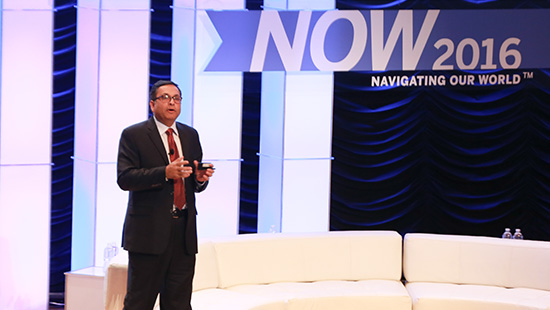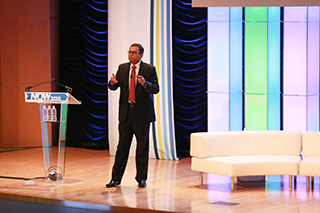
A revolution from new technology is creating ways to generate, access and learn from data that will sweep many businesses into obsolescence and clear the way for the rise of digital powerhouses. The new technological paradigm—perhaps the most profound shift in history—will generate massive amounts of wealth, but require courageous decision-making, according to Manoj Saxena, founding partner of The Entrepreneurs' Fund and former general manager of IBM Watson.
Throughout history, innovation has usually progressed at a measured pace. Today, however, we are witnessing a "super convergence" of six simultaneous trends in a short period—cloud computing, mobile devices, social media, artificial intelligence, big data and the rise of the millennial generation, Saxena said. These forces may synergize into a "smarter society" with tremendous potential.
Progress may blossom in many forms as the various components of our life become more connected. Greater connectivity will streamline daily tasks, enabling us to better control the comfort and security of our homes and workplaces. Vastly stronger computational power will improve health care. Meanwhile, the cost of computing will plunge, pushing back limits on capacity year after year with no increase in cost, Saxena predicted. Here are some of the building blocks for future advances:
Intelligent devices, and the networks on which they operate, are progressing so quickly that, in the near future, the world will become one's Internet browser, with each individual a "cursor," Saxena said. Knowledge from the Internet will be at one's ngertips via smartphones, watches and eyeglasses.
 Artificial intelligence may prove to be the most sweeping development, with investors funding thousands of companies to pursue it. Yet 90% of the companies will probably fail because, as they rush into the field, investors will overlook business model weaknesses.
Artificial intelligence may prove to be the most sweeping development, with investors funding thousands of companies to pursue it. Yet 90% of the companies will probably fail because, as they rush into the field, investors will overlook business model weaknesses.
Data will become the new oil—an increasingly essential driver for the economy. Computers will soon be able to understand much of the "dark data" that is currently beyond their ken. Programmers have already unlocked music and video to computational power. Tomorrow, nancial statements, news articles and lengthy reports will be subject to computation. Before long, people will be able to harness machines to aid their thinking like never before, Saxena predicted.
The companies most likely to succeed will harness these forces to provide customers with solutions rather than just new technology, Saxena said, referring to the rapid rise of some digital giants. He noted that Uber, the world’s largest taxi company, does not own any cabs just as AirBnb, the world's largest hotel company, does not own a hotel. The two companies have thrived by using technology to strip away layers of infrastructure, Saxena said. They have "unbundled" their industries while focusing on improving the customer experience.
With data as the grist for this radical change, the current challenge lies in understanding and leveraging the avalanche of information, Saxena said. Roughly 90% of the world’s data was created in the last two years, and 80% of it cannot yet be understood by computers. Only 29% of companies say that they can make use of the understandable data. Consequently, humans are awash in exponentially rising volumes of information while lacking the "refineries" to process it. That, according to Saxena, offers entrepreneurs and innovators a substantial opportunity.
The views expressed are those of the author and Brown Advisory as of the date referenced and are subject to change at any time based on market or other conditions. These views are not intended to be and should not be relied upon as investment advice and are not intended to be a forecast of future events or a guarantee of future results. Past performance is not a guarantee of future performance. The information provided in this material is not intended to be and should not be considered to be a recommendation or suggestion to engage in or refrain from a particular course of action or to make or hold a particular investment or pursue a particular investment strategy, including whether or not to buy, sell, or hold any of the securities mentioned. It should not be assumed that investments in such securities have been or will be profitable. To the extent specific securities are mentioned, they have been selected by the author on an objective basis to illustrate views expressed in the commentary and do not represent all of the securities purchased, sold or recommended for advisory clients. The information contained herein has been prepared from sources believed reliable but is not guaranteed by us as to its timeliness or accuracy, and is not a complete summary or statement of all available data. This piece is intended solely for our clients and prospective clients, is for informational purposes only, and is not individually tailored for or directed to any particular client or prospective client.
This communication and any accompanying documents are confidential and privileged. They are intended for the sole use of the addressee. Any accounting, business or tax advice contained in this communication, including attachments and enclosures, is not intended as a thorough, in-depth analysis of specific issues, nor a substitute for a formal opinion, nor is it sufficient to avoid tax-related penalties
